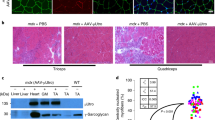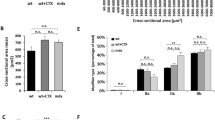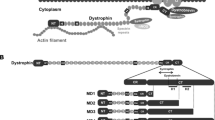Abstract
Duchenne muscular dystrophy (DMD) and murine X-linked muscular dystrophy (mdx) are both due to absence of the subsarcolemmal protein dystrophin. Recombinant adenovirus vectors (AdV) are considered a promising means for delivering a functional dystrophin gene to muscle. However, the usefulness of AdV for this purpose is limited by vector toxicity as well as immune-mediated elimination of infected fibers. In addition, studies to date of AdV-mediated dystrophin gene transfer have either failed to examine effects on muscle strength or been performed in immunologically immature neonatal animals with little baseline abnormality of force-generating capacity. In the present study, AdV-mediated dystrophin gene transfer was perfor-med in adult mdx mice with pre-existent dystrophic patho- logy and muscle weakness. The main findings are as follows: (1) acute myofiber toxicity and gene transfer efficiency are both AdV dose-dependent, such that the therapeutic margin of safety is fairly narrow; (2) immunosuppressive therapy (FK506) prevents immune-mediated elimination of dystrophin-positive fibers but not the dose-dependent toxic effects; (3) at the optimal vector dosage and with effective immunosuppression, AdV-mediated dystrophin minigene transfer is capable of alleviating the loss of force-generating capacity as well as histopathological evidence of disease progression normally seen in adult mdx muscles over a 2-month period. These findings have important implications for the eventual application of AdV-mediated dystrophin gene transfer in DMD patients.
This is a preview of subscription content, access via your institution
Access options
Subscribe to this journal
Receive 12 print issues and online access
$259.00 per year
only $21.58 per issue
Buy this article
- Purchase on Springer Link
- Instant access to full article PDF
Prices may be subject to local taxes which are calculated during checkout
Similar content being viewed by others
Author information
Authors and Affiliations
Rights and permissions
About this article
Cite this article
Yang, L., Lochmuller, H., Luo, J. et al. Adenovirus-mediated dystrophin minigene transfer improves muscle strength in adult dystrophic (MDX) mice. Gene Ther 5, 369–379 (1998). https://doi.org/10.1038/sj.gt.3300600
Received:
Accepted:
Published:
Issue Date:
DOI: https://doi.org/10.1038/sj.gt.3300600
Keywords
This article is cited by
-
Gel-mediated Delivery of AAV1 Vectors Corrects Ventilatory Function in Pompe Mice With Established Disease
Molecular Therapy (2010)
-
Restoration of dystrophin expression in mdx mice by intravascular injection of naked DNA containing full-length dystrophin cDNA
Gene Therapy (2004)
-
CTLA4Ig delivered by high-capacity adenoviral vector induces stable expression of dystrophin in mdx mouse muscle
Gene Therapy (2004)
-
Electrotransfer of naked DNA in the skeletal muscles of animal models of muscular dystrophies
Gene Therapy (2001)
-
Efficient repetitive gene delivery to skeletal muscle using recombinant adenovirus vector containing the Coxsackievirus and adenovirus receptor cDNA
Gene Therapy (2001)



